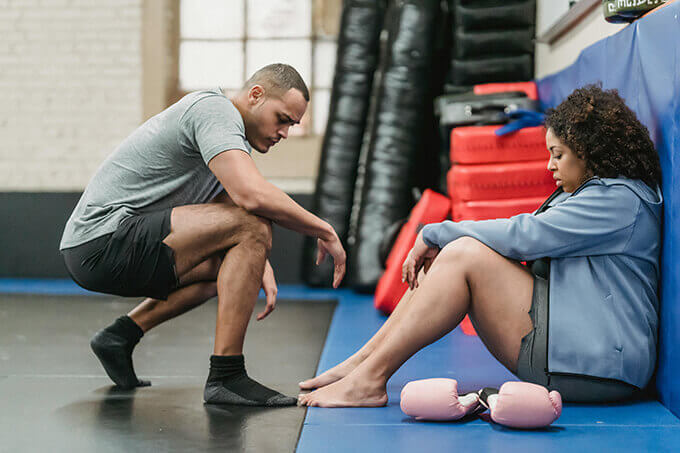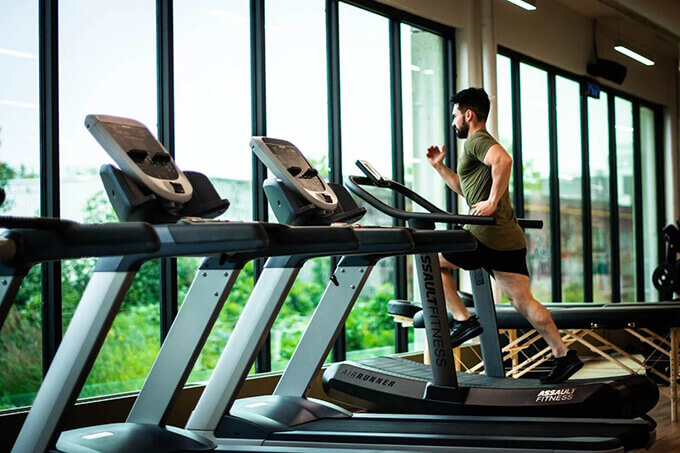Can Regular Exercise Help Prevent Hair Thinning?
- Written by Kobla Kugbega
- Feb 12, 2025
- |
- 7 min read
 Listen to the full text
Listen to the full textThinning hair is a widespread concern, affecting more than 50% of men and women at some stage in their lives. A report from Harvard Medical School reveals that stress, one of the leading causes of hair thinning, can be relieved through physical exercise. With all the benefits that come from exercising, a question that lingers is: Does exercise contribute to keeping our hair thicker and healthier, even for those who wear a hairpiece? Let’s examine the science behind this and experts' views to better understand this connection between regular exercise and hair thinning.
How Is Exercise Related To Scalp Health?

Exercise is known to be associated with better blood circulation which directly improves scalp health. Scalp possesses lots of minute blood vessels responsible for nourishing hair follicles with oxygen and other nutrients. Improved blood circulation means improved nourishment and subsequently stronger hair growth.
A study published in The Journal of Dermatological Science discovered that enhanced circulation to the scalp can trigger hair follicles to form and become more active. Even if exercise doesn't completely fix hair thinning, it can help increase circulation which can foster a hair friendly environment.
Stress Reduction: A Crucial Factor
Stress and tension are one of the best-known causes of hair thinning that leads to premature telogen effluvium that can result into early shedding of hair. Natural stress relievers such as exercises reduce the levels of endorphins in the body and increase cortisol levels, the stress hormone which leads to increased sense of well being in individual.
As noted in increasingly more literature from Harvard Health, stress-related hair loss may be lessened or mitigated by regular physical exercises. Activities such as yoga, jogging, or brisk walking will lessen the stress load on hair follicles and decrease the chances of baldness.
Exercise and Hormonal Balance
Another contributing factor of hair thinning seems to be hormonal imbalance which plays an important role in hair type conditions such as androgenic alopecia. Exercise helps to regulate hormone levels such as testosterone and dihydrotestosterone that are harmful to hair follicles if produced in excess.
The National Center for Biotechnology Information (NCBI) attended some studies and advanced moderate intensity exercises for balance hormones and indicated that it could slow down the rate of hair thinning. On the other hand, moderate exercises seem to have their own effect of increasing cortisol level which is detrimental.
Sweat and Scalp Detoxification
Sweating while exercising is not only natural but also enables the body to cleanse itself of toxins. Detergent aids in unclogging scalp hair follicles and free up all the dirt, oil, and dead skin cells that are build up on the scalp. This cleansing process paves the way to better hair growth.
An article published in The Jerusalem Post has pointed out the merits of sweating but has also reminded us that it is important to shampoo one's hair after extensive workouts to avoid a mix of sweat and oil from the scalp as that may lead to irritation and dandruff.
How Absorvation Of Nutrients Works

Exercising ensures that nutrient absorbtion and entire metabolism of the body is on point, and this makes sure of the health of the hair. Biotin, zinc and vitamin D, being the commonly known for are also very important for the proper functioning of hair. Exercise indeed improves the body’s ability to absorb and utilize these nutrients.
Per a report by the British Journal of nutrition 2021, people who are active tend to have higher standards of essential vitamins and minerals that can be useful for the quality and growth of hair. Regular exercise with a good diet can do wonders.
Enhancing confidence and mental well-being
Self-esteem and mental wellness can face challenges with hair thinning. Improvement in mood and reduction of anxiety accompanied with regular exercise can boost mental health. Physical activities also indirectly lead to support for hair health by reducing stress-related hair loss. Hair replacement systems also serve as a source of confidence and self-assurance.
As Mayo Clinic claims, people who engage in consistent exercise have better mental well-being, and higher self-confidence which is important for those suffering from hair thinning.
Which Kind Of Exercise is Effective For Hair Health?
Not every exercise is as helpful for promoting hair health, but there are many that are. Here is a list of few:
Cardio Exercise:
Activities such as running, swimming and biking greatly increase blood flow and oxygen to the scalp.
Meditation and Yoga:
Both these activities help with stress reduction and hormonal balance and are beneficial in hair thinning prevention.
Yoga for the Scalp:
Facial yoga and scalp massages aid in increasing blood flow to the scalp and can be done alongside traditional forms of exercise. Moderate weight lifting also helps in hormone balance when done correctly in conjunction with other exercises.
Limitations and Considerations
Exercise remains beneficial to hair health, but it cannot be the only solution. Other factors like genetics, existing medical conditions, and lifestyle choices also contribute significantly to hair thinning. For instance:
1. Genetic:
Things like male or female pattern baldness are hereditary and often require medical attention.
2. Nutrition:
When coupled with a bad diet, exercise can do more harm than good because of the lack of essential nutrients for hair growth.
3. Medical:
Thyroid imbalance, autoimmune disease, or infections of the scalp need the attention of a medical practitioner.
Conclusion
A single session of vigorous exercise will not arrest hair thinning, but regular workouts bring along positive effects on hair health. With stress management, soothing of hormones, and enhanced nutrient absorption, the body is primed for healthy hair growth. Corrective exercises are more effective when paired with healthy eating, effective scalp hygiene, and holistic medical treatment when necessary.
Talking to a dermatologist or a hair loss consultant can be helpful for hair thinning patients. With moderate hair loss, one remains proactive about looking after their locks when shifting with exercise and other hair maintenance measures.


